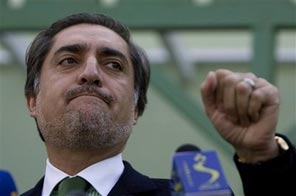Abdullah may pull out from runoff
KABUL: Afghan presidential challenger Abdullah Abdullah plans to boycott next week's runoff against incumbent Hamid Karzai following a breakdown in talks on how to fix the country's electoral crisis, two people familiar with the discussions said.
A boycott would severely undermine a vote intended to affirm the Afghan government's credibility. However, an Abdullah spokesman said no final decision had been made on the candidate's pullout, and that Abdullah will announce his decision Sunday morning. It was possible that word of the boycott was a negotiating tactic by the Abdullah camp.
The political stalemate in Kabul comes as President Barack Obama has been meeting with his advisers to try to determine U.S. strategy in Afghanistan, including troop levels. A weakened Afghan government will make it harder for Obama to get public support for his efforts.
Abdullah, who was once Karzai's foreign minister, put forward several conditions this week to avoid a repeat of the massive fraud of the August presidential election, including the replacement of the top election official and the suspension of several ministers.
He set Saturday as the deadline for his demands to be met.
A Westerner close to talks between the two sides said their agenda also included a power-sharing proposal by the challenger and cited both Karzai and Abdullah as saying that talks broke down Friday, prompting Abdullah to decide on a boycott of the Nov. 7 runoff.
An Afghan figure close to Abdullah said Saturday that the boycott decision came after a contentious and fruitless meeting Thursday over Abdullah's conditions for a runoff.
Both spoke on condition of anonymity, saying that the announcement must come from Abdullah himself.
The Afghan said a boycott was certain, and that Abdullah would likely tell his supporters to simply stay home during the vote.
The Afghan constitution says that any vote cast for a candidate who withdraws will not be counted. However, it does not specifically address a candidate who does not formally withdraw but urges supporters to boycott the polls.
A spokesman for the Afghan election commission said that it is too late for Abdullah to officially withdraw and that a boycott will not prevent the runoff from going forward.
"The election will be held and all procedures will go as normal," Noor Mohammad Noor said.
US Secretary of State Hillary Rodham Clinton said a runoff with only one candidate would not necessarily threaten the legitimacy of the process.
"We see that happen in our own country where, for whatever combination of reasons, one of the candidates decides not to go forward," Clinton told reporters in Abu Dhabi, United Arab Emirates. "I don't think it has anything to do with the legitimacy of the election. It's a personal choice which may or may not be made."
A spokesman for the Abdullah campaign, Fazel Sancharaki, said no decision had been made on a boycott and that the candidate would wait until the end of Saturday to see if his demands are met before making any announcement.
Abdullah canceled a planned trip to the Indian capital, Delhi, to attend a conference there Saturday. Sancharaki said Abdullah will announce his decision Sunday morning.
The runoff election in Afghanistan became necessary after widespread fraud in the first round of voting in August resulted in hundreds of thousands of Karzai's ballots being invalidated, pushing him below the required 50 percent margin to win. Concerns have been raised about a possible repetition of the ballot-box stuffing and distorted tallies in the second round.
Abdullah complained Monday that there were no assurances that the November vote would be fairer than the first balloting and demanded that the head of the Karzai-appointed Independent Election Commission, Azizullah Lodin, be fired.
Lodin has denied allegations of bias in favor of Karzai, and the election commission's spokesman has already said Lodin cannot be replaced by either side.
Abdullah's conditions also include the suspension of several ministers and for more safeguards around the actual vote.
In private discussions, Abdullah also pressed Karzai for a power-sharing agreement instead of a vote, but Karzai refused, insisting instead on a vote and then a power-sharing agreement, the Westerner close to the talks told The Associated Press.
A Karzai campaign spokesman said that "there was some negotiation" but that he didn't have details of what was discussed in the talks. It is certain, however, that the discussions did not result in a power-sharing deal, Noor Akbari said.
Asked what an Abdullah boycott would mean for the runoff, Akbari said it would not affect the Nov. 7 vote.
"In our constitution we have no other way but to go through with an election," Akbari said. "If anybody boycotts it's a crime and it's an illegal act."
Despite the massive fraud and rejected ballots, Karzai's vote in the first round was far higher than Abdullah's and he is widely expected to win the runoff.
While Abdullah's campaign team has opened offices in many provinces, they have been waiting to start campaigning until they find out if their conditions are met, Sancharaki said.
This year's election — the first run by Afghans since the ouster of the Taliban — was supposed to affirm the government's credibility. Instead, the massive fraud raised questions about the Karzai administration just as U.S. officials are debating whether to send more troops.
On Saturday, the NATO-led force announced the latest coalition death in the war. The Canadian Defense Department said the casualty was a 24-year-old Canadian national killed in a bomb blast outside the southern city of Kandahar on Friday.
The Taliban, who threatened voters during the August balloting, have warned Afghans that they risk further attacks if they do not stay away from the polls next week.
On Wednesday they targeted a U.N. guest house where 34 staff — including a number of U.N. election workers — were sleeping. Eight people were killed in the assault, five of them U.N. staff members.






